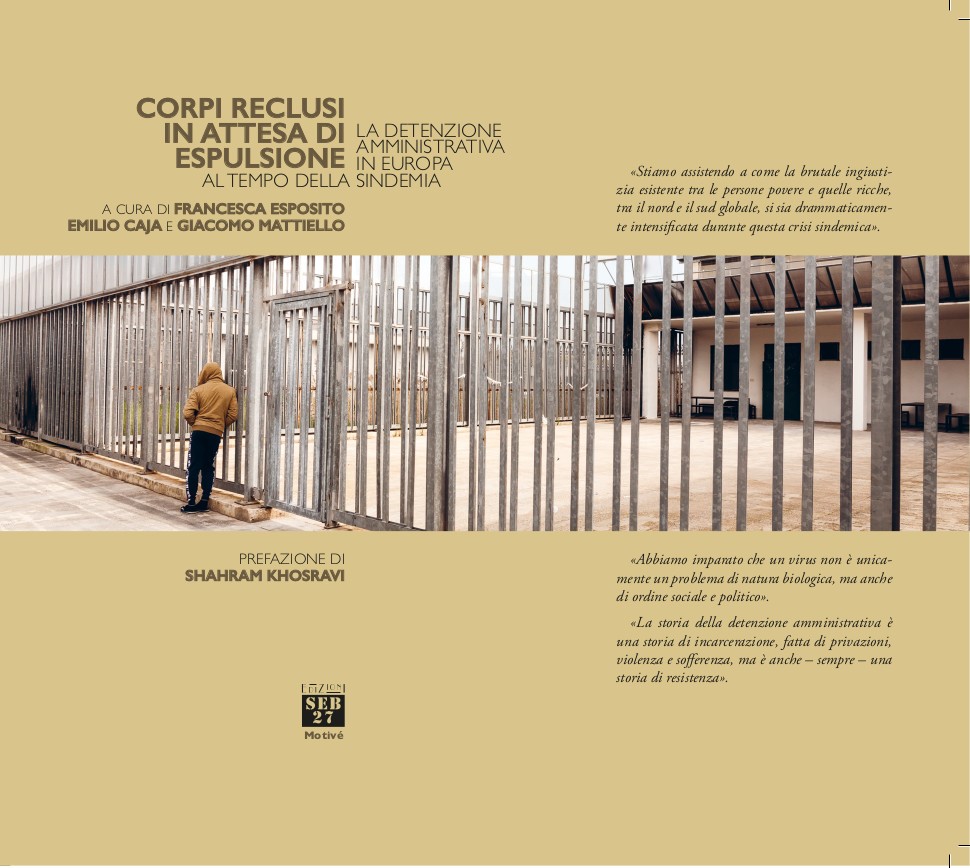Book launch: Landscapes of immigration detention in Europe at times of the Covid-19 pandemic: envisioning abolitionist futures

This book – which brings together contributions from scholars, activists and people with lived experience – provides an overview of what happened to people confined inside immigration detention centres during the Covid-19 syndemic (Horton, 2020; Iron, 2020; Singer 1994). In doing so, it looks at the European context (Italy; Germany; Greece; Sweden; Denmark), also considering countries that are geographically within Europe but formally not (anymore) inside the political union (e.g., Serbia and the United Kingdom).
What has happened in this period of global pandemic, and related lockdowns, in detention centres which, already in ‘normal’ times, are largely invisibilised sites? Have new practices emerged and may these be maintained, expanded and exported in the near future? What does the ‘exceptional’ nature of this period tells us about the ‘ordinary’ mechanisms at play in these custodial institutions?
What the different contributions describe is a situation of abandonment, neglect and abuse on the part of state authorities and private corporate actors who collaborate with them, as well as a selective functioning of the detention system which ultimately reproduces a racialised and gendered hierarchy of ‘detention deservingness’. Alongside violence, however, this volume also illuminates the voices of dissent, the actions of solidarity aimed at piercing the veil of opacity and isolation around detained people, as well as the daily acts of individual and collective resistance aimed at challenging and dismantling the detention and deportation system. Taken together, this large body of evidence argues that the abolition of this system of daily violations of human dignity is the only viable alternative in the near future.
Edited by Francesca Esposito, Emilio Caja, and Giacomo Mattiello
Preface: Shahram Khosravi
Contributors: Ana Ballestros-Pena; Mary Bosworth; Emilio Caja; Eleonora Celoria; Francesca Esposito; Giulia Fabini; Sunjay Gookooluk; Evgenia Iliadou; Norbert Kreuzkamp; Annika Lindberg; Giacomo Mattiello; Sanja Milivojevic; Martina Tazzioli; Elahe Zivardar.
Authors/Speakers:
Dr. Francesca Esposito
Francesca Esposite is Lecturer at Westminster University of London. She is also Associate Director of Border Criminologies and Research Associate at Oxford University, as well as Research Fellow at the Institute of Social Sciences of Lisbon. Her work draws on intersectional feminisms and focuses on border violence, particularly immigration detention, and bottom-up forms of resistance and solidarity.
Prof. Mary Bosworth
Mary Bosworth is Professor of Criminology and Director of the Centre for Criminology at the University of Oxford as well as, concurrently, Professor of Criminology at Monash University, Australia. Mary has written extensively about immigration detention in the UK. She is currently conducting research into deportation and immigration detainee transportation.
Prof. Sanja Milivojevic
Prof. Sanja Milivojevic is Associate Professor in Digital Futures at Bristol University. She is also Research Fellow in Criminology at La Trobe University, Melbourne, Australia and co-Director of Border Criminologies at Oxford University. Sanja holds LL.B and LL.M from Belgrade University’s Law School, Serbia, and a PhD from Monash University, Australia. Her research interests are borders and mobility, human trafficking, security technologies and surveillance, gender and victimisation, and international criminal justice and human rights.
Dr. Annika Lindberg
Annika Lindberg (she/her) is a postdoctoral fellow at the Centre for European Research/School of Global Studies, University of Gothenburg. Her research focuses on detention and deportation regimes, state violence and bureaucracy in Northern Europe.
This event will be held in English.
Online attendance is also available. You can register here.
